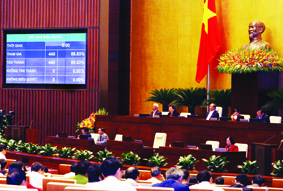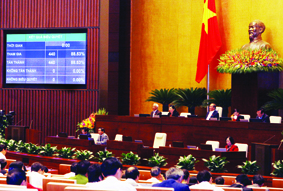Jairo Acuña-Alfaro, Đặng Ngọc Dinh, Đặng Hoàng Giang, Edmund J. Malesky, Paul Schuler, Đỗ Thanh Huyền[1]
Introduction
In 2010, Vietnam made its official transition to the ranks of a middle-income country and continued on its path towards meeting citizens’ expectations for better governance, public administration performance and service delivery. Now, the country is a fully fledged middle-income country with an increasing middle class and far greater opportunities for the next generations. The country’s human development index has increased from a low score of 0.476 in 1990 to the middle category of 0.623 in 2013[2]. In addition, income per capita has substantially increased from only USD 285 in 1985 to USD 1,910 in 2013[3]. This shift in development stages also means people’s expectations of governance in general, and public administration and public service delivery in particular, are changing. The more educated, healthier and wealthier citizens become, the more demanding they are of government service provision.
In line with this transition, policy making has started to shift from data-averse to evidence-driven, as well as towards appreciation of external policy monitoring tools. The Provincial Governance and Public Administration Performance Index (PAPI) is one of the external time-series data sources being used to measure governance and public administration performance of governments at different levels from the perspective of citizens’ experiences. In addition, there is the Provincial Competitiveness Index that measures businesses’ experiences with provincial economic governance. These complement self-assessment tools like the Public Administration Reform Index (known as the PAR-Index) created by the Ministry of Home Affairs. These tools provide a gold mine of data for policymakers and researchers to triangulate government-business-citizen assessments of policy implementation so as to inform subsequent policy reforms.
Yet, important challenges in governance and public administration remain ahead as Vietnam aims to avoid falling into the middle-income trap. One of the challenges is to advance from a better availability of basic services to a higher quality of governance and public service provision to address the shift in citizens’ expectations. These challenges can be addressed when implementation of recent and upcoming policy reforms is monitored and assessments are taken into account by central and local governments.
[1] The article is authored by Mr. Jairo Acuña-Alfaro, Policy Advisor on Responsive and Accountable Institutions (UNDP New York), Dr. Đặng Ngọc Dinh and Dr. Đặng Hoàng Giang (Director and Deputy Director of CECODES), Associate Professor of Political Economy Dr. Edmund J. Malesky from Duke University (UNDP international consultant on governance measurement), Postdoctoral Fellow Dr. Paul Schuler from Stanford University (UNDP international consultant on research quality control) and Ms. Đỗ Thanh Huyền (Policy Analyst, UNDP Vietnam).
[2] See UNDP’s Human Development Indicators, available at https://hdr.undp.org/en/countries/profiles/VNM
[3] See World Bank’s World Development Indicators, available at https://data.worldbank.org/country/vietnam#cp_wdi









